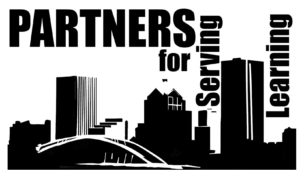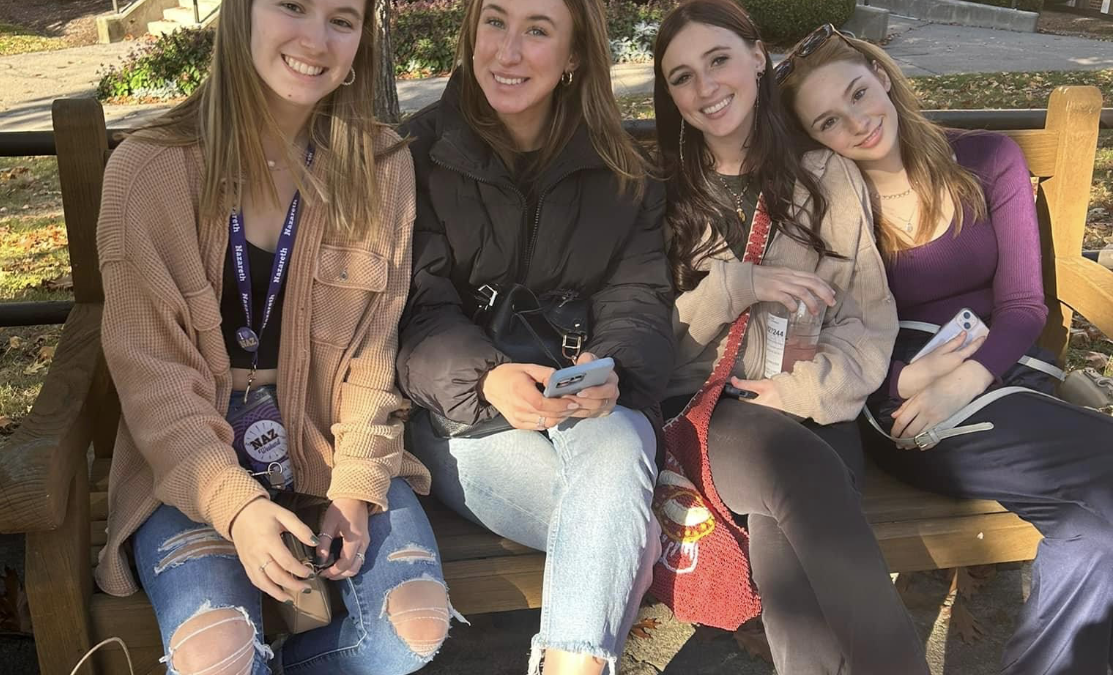- Exploring personal values and beliefs
My belongingness belief was called into question when I first came to Nazareth. Coming to college and not knowing anyone was very scary as for my whole life I grew up in the same town surrounded by the same people. Being in the same community my whole life, I felt more comfortable doing my own thing because everyone knew each other. However, coming to college I had to reintroduce myself to not only myself but to everyone around me. By joining Partners For Serving (PFS), I have explored different personal values and beliefs. This program gives  students the opportunity to engage with youth and adults at human service agencies throughout Rochester. One value that I believe was strengthened by PFS was confidence. As I am a very shy person it is very hard for me to break out of my shell. By being involved in PFS, I have definitely learned how to be more confident whether it is starting conversation myself or putting myself out there more. One major value I encountered that was different from my own was grace. A lot of partners I have met are very thankful for everything they experience in life. I think seeing and being around people who are more thankful and have grace has affected my ability to work with people within PFS. Some people might not have as much as others. That fact does not mean anyone should look at them differently, but rather accept, embrace, and acknowledge the things they do have, such as their families, friends, and companionship. Being around more people who are more thankful than I am has encouraged me to look at another side of things and start to be more thankful and have grace for everything I have in life.
students the opportunity to engage with youth and adults at human service agencies throughout Rochester. One value that I believe was strengthened by PFS was confidence. As I am a very shy person it is very hard for me to break out of my shell. By being involved in PFS, I have definitely learned how to be more confident whether it is starting conversation myself or putting myself out there more. One major value I encountered that was different from my own was grace. A lot of partners I have met are very thankful for everything they experience in life. I think seeing and being around people who are more thankful and have grace has affected my ability to work with people within PFS. Some people might not have as much as others. That fact does not mean anyone should look at them differently, but rather accept, embrace, and acknowledge the things they do have, such as their families, friends, and companionship. Being around more people who are more thankful than I am has encouraged me to look at another side of things and start to be more thankful and have grace for everything I have in life.
- Evaluating your learning, skills, strengths, and challenges
I have always worked with helping people and being involved in my community, such as my high school’s community-wide dialogue where we would connect with a more diverse high school to talk about how to reduce racism in schools. I have also taught and helped younger kids with their homework and learning skills, whether it was through a center or by mentoring. I think a big thing I learned from my interactions with youth and the community is if you can gain someone’s trust and respect, then it can become easier to try and help someone out. I say this because working with many different people in the community — whether it was in Rochester or Syracuse — it can be very frustrating to try and help someone if they don’t want the help or trust you enough to let them in. Having prior knowledge with helping others in my community has helped me be successful working with PFS. I get to build off my prior experience to help myself become successful within new opportunities thrown my way. I get to connect to more people to help make more of a difference in not only their lives, but in the community as well.
- Integrating academic and PFS experience
Since I am a psychology major, I feel my experiences through PFS are something I also recognize in my required courses. In my freshman year, I took a community youth development course. We spent a lot of time talking about anti-racist practices and how to apply them. I found it so interesting how in the PFS panels I go to, they also talk about the same things. I think going to a lot of the panels and continuously hearing similar things has helped me understand problems found within our community and world.
- Developing relationships with others who have different beliefs/backgrounds
Through PFS, I have experienced meeting a lot of people from different backgrounds than me. For example, at a local library class for new Americans, I met people from China, Iran, Afghanistan, and India. It became really interesting to talk to people once a week, face to face, about their country and learn more about the world. I consistently worked with one woman from China. She was good at reading and writing in English. One day I thought of having a conversation with her. I started off by asking her about her favorite food here and in China. She eventually ended up asking me what my favorite Chinese food was and I replied sesame chicken. She giggled and stated that they actually do not cook/eat that in China and how the food in Chinese restaurants is more Americanized to seem more appetizing. I never really thought about that, and it was very interesting to hear how my conceptions about different ethnic foods served in the U.S. are wildly different. This experience has made me want to learn about more differences in other cultures.

